
You are reading:

You are reading:
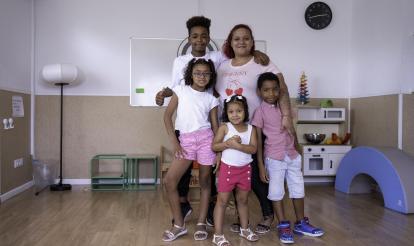
01.09.25
8 minutes readThe ”la Caixa” Foundation’s CaixaProinfancia programme supports children from vulnerable families through its social and educational initiatives, which range from academic reinforcement to emotional care. As the new school year begins, Estefanía Villalba and Elisabeth Ayala, single mothers of large families, share how the programme benefits their children, alongside the educator and programme specialist Bea Hernández.
Félix, Chloe, Eury and Daeneris are twelve, eight, seven and four years old. They are the four siblings of a single-parent family headed by Estefanía Villalba, who is 33, Venezuelan, and has lived in Spain since she was six. They live in a modest neighbourhood in the Carabanchel district of Madrid and take part in the CaixaProinfancia programme run by the ”la Caixa” Foundation through the social organisation Redes Cooperativa, which supports children in vulnerable situations and their families.
Villalba began attending Redes when her eldest son, Félix, was just four months old: “My son was little and everything was new to me. I felt very alone and adrift. It was like a little push forward,” she recalls. The support from the CaixaProinfancia programme has helped them: “I’m very grateful because my children have made so much progress.” She does not have an employment, so support like this is vital. “I’m a mother without resources and I can’t access many things. This means a lot to me, and especially to them,” says this mother, who has also received psychological care through the programme.
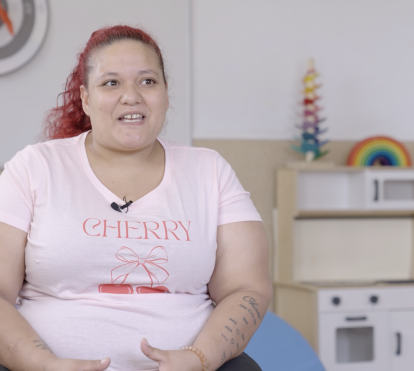
Behind all that support is Redes Cooperativa, an organisation made up of female social intervention professionals who work with children and their families, and also assist other social entities through training and consultancy.
In the field of childhood support, they provide help both educationally and emotionally, as well as offering guidance to families. “It’s not just a question of working on isolated aspects of the children and families; the important thing is to address all dimensions so that the support is more complete and more holistic,” says Bea Hernández, educator and member of the cooperative.
This social organisation is one of 400 that make up the CaixaProinfancia network, the programme through which the ”la Caixa” Foundation seeks to tackle child poverty by providing social and educational support to children from disadvantaged backgrounds. This new school year, the programme will assist more than 65,000 children, young people and adolescents from over 41,000 families across the country.
In Carabanchel, through this programme Redes Cooperativa offers services such as one-to-one academic support, speech and language therapy, assisted study groups, psychomotor sessions, care for children aged zero to three, social support and leisure and free-time activities, among others.
CaixaProinfancia supports families facing various kinds of vulnerability: “There are situations of poverty and violence, and in other cases, emotional or psychological factors that prevent children from progressing. We’re also seeing more learning disorders and situations involving autistic children,” explains Hernández, a trained educational specialist who has been working at Redes Cooperativa for 13 years.
These situations vary widely, and the programme adapts to each one: “Every family is a world of its own. We work very much from a person-centred approach, responding to the needs of each of these families,” Hernández adds.
The profiles of the children who take part are also diverse, but in many cases they share a common factor: “significant educational difficulties caused by their vulnerable situations.” “Some are living in environments that can trigger emotional blocks and learning problems. This prevents them from developing normally in an educational setting,” Hernández explains. As for the families, they face material needs, but also require “emotional support and guidance to help them deal with situations and manage day-to-day life,” the educationalist adds.
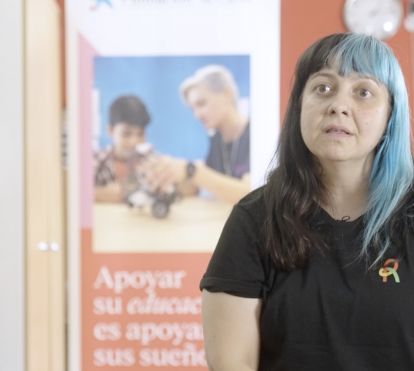
Another of these families is made up of José Ignacio, Sofía, Paola and Jerome, along with their mother, Elisabeth Ayala, aged 48. The first two are 13-year-old twins, the third is 12, and the youngest is eight.
They have been taking part in the services offered by Redes Cooperativa and CaixaProinfancia since the twins were about six months old. “I came here after another family told me about it, because I really needed help. I had two little ones and was pregnant with the third. They helped me a lot, and thanks to Redes and the ”la Caixa” Foundation I’ve been able to move forward,” says Elisabeth Ayala, who works for a home-care company supporting elderly people. “At first it was hard for the children, they were shy and didn’t want to come,” she recalls, “but little by little they’ve started to interact with their classmates.”
She has also received psychological support from the organisation, and says that taking part in the programme has helped her to socialise: “I attended groups for single mothers and, although I was shy at first, I gradually adapted. I’ve met many mums in the same situation, made friends, and it’s helped me become more independent.”
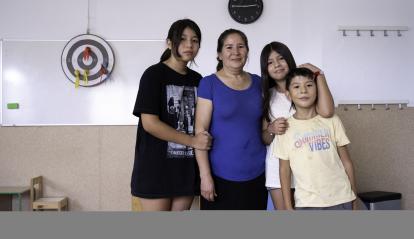
An important part of CaixaProinfancia is the educational support the children receive. The educator explains that the aim of this resource is “to guide them so that they reach an educational level appropriate for their age and what we understand as a normal situation at school: keeping broadly in step with the curriculum and cognitive development expected for their age.”
What do they do to achieve that? It depends on each child’s situation. In some cases, they help them with their homework. In others, they simply need to provide a place where they can do it: “There are many little ones who can keep up perfectly well, but at home they don’t have spaces prepared for studying, doing their homework and so on,” explains Hernández.
In other cases, there are children with greater learning difficulties who require more targeted support: “Sometimes it’s not just about turning up and doing homework. We’re equipped to support them in getting ready to learn, in working on executive functions.” The educator illustrates it like this: “It’s not just about learning to multiply. Perhaps that little one isn’t ready to multiply yet because they’ve missed a lot in the education system during their short life, and that’s why we need to support that preparation for learning.”
Educational support takes on special importance at this time of going back to school in September.
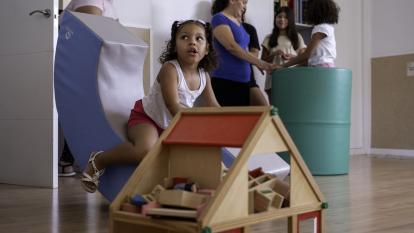
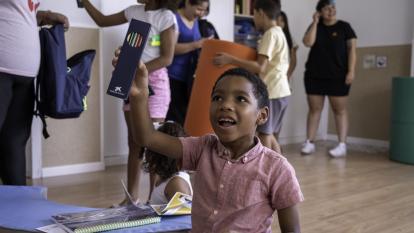
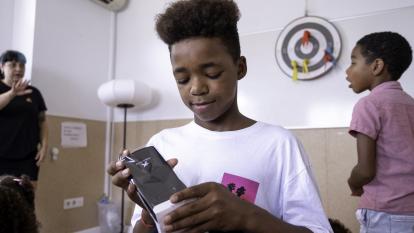
The team of professionals from the CaixaProinfancia programme provides particular support to those who are changing educational stages, a time that can be challenging. In addition, the pupils who take part in the programme receive new school materials at the start of each school year. “It’s most noticeable when moving from early years to primary, because they go from being in a very sheltered environment to a slightly more hostile one: they’re no longer with the same classmates, and the pace and quality of attention is different, with less individual care,” explains Hernández.
Later, in the transition from primary to secondary school, there is also a significant disruption. “Given their circumstances, we’re less concerned about the academic side and more focused on the emotional impact of that change and everything that comes with adolescence. At that stage too, we provide support and pay very close attention to their emotional needs.”
The services these organisations provide to support children and their families are very well received. Hernández sees the clearest example when the urban summer camps they organise come to an end and there are “children crying because the camps are over and they’ve suddenly found a network.” “Sometimes, they have quite a lot of difficulty making friends, and the urban camps are a breeding ground for new friendships, with children spending five weeks together, six hours a day, with great intensity. Very special bonds are formed, also with the educators. Many of them also find their place, the place where they want to be,” says the educator.
Estefanía Villalba, mother of Félix, Chloe, Eury and Daeneris, confirms that her children are delighted: “They love everything; they never want to go home. The best part is going; the problem is getting them to leave the activities.” She is very grateful for the attention of the programme’s professionals: “They treat them really well and are very involved with the families. It’s not just a case of ‘Hi, how are you? I’m dropping off my kids at an activity and I’ll pick them up in two hours.’ There’s integration; they ask the children lots of questions, and you can feel the affection.” “Redes doesn’t just offer us activities: the simple fact that someone outside the family listens to them and helps them express themselves has also been very good for them at school,” says this mother.
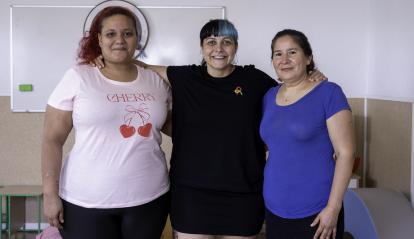
With both educational and emotional support, social initiatives like these help break the cycle of poverty, the one that means the sons and daughters of parents with limited resources have fewer opportunities to improve their circumstances.
Villalba does believe in a promising future for her family: “Like any mother, I’d love for them to go to university, whatever they want, but for them to study something worthwhile. I see them going very, very far.”